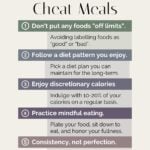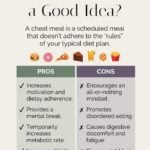Cheat meals are a polarizing topic in the fitness community, as some experts tout their health benefits and others suggest their name alone is problematic. So, are cheat meals a good idea? Here is a breakdown of the pros and cons of cheat meals and some alternative strategies you can use instead.

Table of contents
What’s a “cheat meal”?
The term cheat meal is scientifically defined as the “discrete, planned, or spontaneous, periodic departure from one’s muscularity-oriented dietary regimen, in a manner that includes consumption of an array of prohibited or restricted foods” (1). Put simply, a cheat meal is a meal that doesn’t adhere to the rules of your typical diet plan.
Cheat meals typically involve calorie-dense foods, higher in carbohydrates, sugar, and saturated fats such as pizza, burgers, French fries, candy, and desserts, in volumes ranging from 1,000-9,000 calories (2). Interestingly, cheat meals are often used as part of a goal-oriented strategy and scheduled ahead of time to be used reward for sticking to a strict diet plan.
While the term cheat meal was popularized by the fitness and bodybuilding community, where they are commonly referred to as “refeeds” or “diet breaks”, cheat meals are now used by everyday gym-goers looking to lose body weight, build muscle, burn body fat, or eat in a certain way to achieve some component of health. A recent study of adolescents and young adults found that 60.9% of men and 53.7% of women have engaged in cheat meals in the last 12 months (3).
What’s the difference between cheat meals and cheat days?
Cheat meals are scheduled meals when you can enjoy foods or a calorie intake that does not adhere to your diet plan, while cheat days are scheduled days when you can consume cheat meals, “off-limit foods”, or excessive caloric intake as much as you like throughout the entire day.

Benefits of Cheat Meals
Here are some of the potential benefits of cheat meals and cheat days.
Increases motivation and dietary adherence.
The use of cheat meals may increase motivation to stick to a diet plan as the prospect of indulging helps increase discipline the rest of the time. Research suggests that “planned hedonic deviations” may increase the motivation to pursue goals and help regain self-regulatory resources, which all contribute to long-term goal adherence (4). Moreover, multiple studies have also shown that people who follow diets with greater flexibility have greater long-term weight loss success (5, 6).
Provides a mental break.
There may also be psychological benefits to cheat meals. Including planned goal deviations, such as cheat meals, during extended goal striving, compared with following a straight and rigid goal-striving process, improves the emotional experience (4). This temporary diet break provides a psychological release where individuals can indulge without guilt or shame.
Temporarily increases metabolic rate.
Not only can cheat meals help to satisfy a craving, but they can temporarily increase metabolism. This increase in metabolic rate is caused by increased levels of leptin, a hormone secreted by fat cells that regulates your energy balance and appetite. Some studies have shown that periods of 3-4 days of consuming more calories than normal, especially from carbohydrates, resulted in increases of 7-8% in Total Daily Energy Expenditure (TDEE) (7, 8).
However, this increase in metabolism is only temporary and does not account for the amount of excess calories it took to create the increase in the first place. That excess energy still needs to be accounted for and, therefore, if used in excess or abused, cheat meals won’t necessarily provide additional benefits for weight loss or body composition goals.
Improves athletic performance.
When used strategically, cheat meals can support and/or improve athletic performance. Known as “refeeds” in the fitness community, increasing calorie intake, namely from carbohydrates, in a planned and strategic manner can help to top up glycogen stores. High glycogen levels can increase energy, improve endurance, increase strength, and improve recovery after a hard training session, all of which can boost performance several days after consumption (9, 10).
Drawbacks of Cheat Meals
Here are some of the potential drawbacks of cheat meals and cheat days.
Encourages an all-or-nothing mindset.
The concept of cheat meals reinforces the idea that you must eat perfectly “clean” to be eating healthy. This dichotomizing of foods as “good” or “bad” creates an unnecessary morality around found choices, which can lead individuals to believe they are being “good” when they follow their diet and being “bad” when they indulge.
Not only does this create a false dichotomy – as whole foods and processed foods can be included in a healthy diet – but this can lead to an unhealthy relationship with food and promote binge eating behaviors.
Promotes disordered eating.
A major concern with cheat meals is their potential to provoke disordered eating behaviors and perpetuate binge eating cycles (11). For certain individuals, cheat meals and the extension of the all-or-nothing mindset can provoke guilt and shame and be accompanied by a sense of loss of control around food. This can cause individuals to ignore their body’s natural hunger and fullness cues, often leading them to eat to a point of discomfort, only to restart the binge eating cycle again.
Slows weight loss progress.
Depending on how indulgent cheat meals or cheat days are, they may drastically increase total weekly calorie intake which will slow or impede weight loss. If abused or done to excess, the calories consumed on cheat days may take an entire week of dieting to lose, contributing to weight loss plateaus or weight gain.
Cause digestive discomfort and fatigue.
Certain foods or meals may also cause gastrointestinal discomfort, such as heartburn, bloating, and constipation, and/or spikes in blood sugar, which can contribute to sluggishness.
So, are cheat meals a good idea?
Overall, the research on cheat meals is mixed and truly depends on the individual. While some will find the incorporation of planned cheat meals helpful in reaching their weight loss, body composition, and health goals, others may find the trigger disorders eating behaviors, impede progress, and make adherence more challenging.
While incorporating “indulgent foods” and “treats” into your dietary plan is the only way to create a balanced diet, how to do so is best determined by the individual. Creating a healthy and balanced diet, complete with whole foods and indulgent foods, is a matter of controlling the dose and frequency per day, week, and month. While the strong majority of your calories (80-90%) should come from nutrient-dense foods in amounts and ratios that support personal goals, the remaining calories (10-20%) can be used as discretionary calories and consumed in any way the person desires.
For example, if a woman is aiming to consume 2,000 calories per day, if 1,600-1,800 calories are used to consume balanced meals with nutrient-dense foods, the remaining 200-400 calories can be used as discretionary calories to enjoy chocolate, chips, or a glass of wine without concern.
The concept of discretionary calories can also be applied on a daily or weekly basis. Meaning that she could choose to use these calories in smaller installments daily (e.g. 200 calories of chocolate per day), or use them in larger installments weekly (i.e. one restaurant dinner with wine and dessert for 1,400 calories).
Furthermore, it is important to consider that it is possible to prepare foods in a manner that exempts them from the “junk food” and discretionary calorie categories by making them with nutrient-dense foods. For instance, a homemade pizza crust with whole-food toppings has far more nutritional value than a greasy take-out slice or ultra-processed frozen pizza with 100 ingredients, additives, and preservatives.

Alternatives to Cheat Meals
If you struggle with cheat days, it may be a sign that your chosen dietary approach is not working for you. So instead of planning for cheat days and cheat meals, here are some strategies you can consider.
- Don’t put any foods “off limits”. Instead of identifying foods as “good” or “bad”, focus on creating a balanced diet by focusing on nutrient-dense foods MOST of the time. Dietary approaches such as flexible dieting are a great way to learn how to meet your calorie and macronutrient needs while eating the foods you enjoy.
- Follow a diet pattern you enjoy. Any overly restrictive diet, be it vegan, keto, or intermittent fasting, can make dietary adherence incredibly difficult and further enforce the all-or-nothing mentality. For instance, if you enjoy carbs, don’t cut them out. Instead, practice moderation – even if it takes a while – and learn how to incorporate both nutrient-dense carbohydrates (i.e. rice, potatoes, oats, and bread), and indulgent carbohydrates (i.e. candy, pastries, and desserts) in quantities and ratios that support your goals and make you feel good.
- Regularly enjoy discretionary calories. Remember that balance does not exist without indulgence. There is room for everything in a healthy diet, even when eating in a calorie deficit for weight, as long as you are mindful of the quantity and frequency. If you’re eating 80-90% of your calories from nutrient-dense foods, the remaining 10-20% can be used as discretionary calories to eat your favorite foods.
- Practice intuitive and mindful eating. Mindful eating focuses on bringing awareness to our eating experience, while intuitive eating focuses on eating based on internal cues, satisfaction, and the health of the mind and body beyond mealtime. When used together, these dietary approaches can help individuals get more in tune with their body’s natural hunger and fullness cues and learn to make healthy food choices without the need for external tools or rigid rules.
- Aim for consistency, not perfection. While moderation can be difficult, it is integral to making healthy eating sustainable. The objective is to be as consistent as possible with healthy food choices, not perfect. It is possible to indulge in your favorite foods while hitting the calorie and macro targets that support your health goals.
Cheat Meals FAQs
No, one cheat meal will not ruin your diet. There is room for everything in a healthy diet, regardless of your goals, even “junk” food.
Generally speaking, one cheat meal is unlikely to ruin your diet, however, it depends on the size of the meal and the individual’s recommended daily calorie intake. For example, on a 2,000-calorie-a-day diet, a cheat meal of 800 calories is unlikely to impede weight loss progress significantly, if at all, however, a cheat meal of 2,500 calories may take several days to recover from to lose the incremental calories consumed to reinstate the required calorie deficit for weight loss.
There is no evidence-based “correct” number of cheat meals to consume per week. How often you should “cheat” on your diet, how, and to what extent depends on the individual and their goals. From a physiological perspective, some individuals will do better enjoying smaller more regular indulgences, while others will enjoy larger less frequent indulgences.

The Bottom Line
A cheat meal is a scheduled meal that doesn’t adhere to the “rules” of your typical diet plan. The potential benefits of cheat meals include increased motivation and dietary adherence, mental relief, increased metabolism, and improved athletic performance, while the potential drawbacks include promoting an all-or-nothing mentality, encouraging disordered eating behaviors, slowing weight loss progress, and causing digestive discomfort and fatigue. Whether or not cheat meals are a good idea largely depends on the individual, their relationship with food, personal eating behaviors, and goals.






Leave a Review